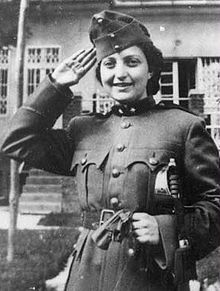Hannah scenes

Hannah Szenes (born as Anikó Szenes on July 17, 1921 in Budapest , Hungary ; died on November 7, 1944 there ) was a Hungarian resistance fighter who parachuted with other Jewish men and women behind the German front to try To save Jews.
Adolescence
Hannah Szenes, the daughter of the journalist and children's book author Béla Szenes , demonstrated her own literary talent from an early age and wrote her diary from the age of thirteen until shortly before her death .
Although her family was assimilated , anti-Semitic influences during her school days in Budapest made her take an interest in her Jewish origins and joined Maccabea , a Zionist school and student movement. In 1939 she graduated from school and emigrated to what was then the British Mandate of Palestine . There she initially studied at an agricultural school and then settled in Kibbutz Sdot Jam .
Rescue mission, arrest, torture and death
In 1943, she volunteered for the British Army in Europe . The aim of the operation was to help the Allies in Europe and to establish contact with partisans in order to provide assistance to Jewish communities under pressure . Scenes was trained in Egypt and selected as one of 33 people to jump behind enemy lines. With the aim of reaching her native Budapest, she parachuted over Yugoslavia in March 1944 and spent three months there with Titopartisans .
On May 13, 1944, at the height of the deportation of the Hungarian Jews, Szenes crossed the border into Hungary. She was arrested the next day after a denunciation by the Hungarian police. The file of the Hungarian government at the time shows that she was subjected to severe torture but did not divulge the code of the secret radio link. She refused to cooperate even when the Hungarian police took her mother to the cell and threatened to torture her as well.
At her trial in October 1944, Hannah Szenes defended her activities and refused to apologize. When she was shot and killed on November 7, 1944 , she refused to wear a blindfold so that she could look the firing squad in the eyes.
In 1950 the bones of Hannah Szenes were brought to Israel and buried in the Har Herzl military cemetery in Jerusalem .
Works
After her death, her literary works were discovered. Her diary and other writings were published, and many of her poems soon became famous for depicting a strong woman, hopeful, even in bad times, in an upright, heroic demeanor. Some of the poems have been set to music.
So z. B. The poem A Walk to Caesarea, written by her in 1942 and set to music by David Zehavi in 1945 ( הליכה לקיסריה, Halika LeKaysarya ), which is called Eli, Eli (אֵלִי, אֵלִי, first verse of the poem) became known. She wrote it when she was in Sdot Jam , a settlement near the then uninhabited, historic town of Caesarea.
|
אלי, אלי, |
Eli, Eli, |
My God, my God, |
In prison she wrote this poem:
Blessed is the match that is consumed by lighting the flame.
Blessed is the flame that always burns in the innermost corners of the heart.
Blessed the heart, the dignity preserved even in its last hour.
Blessed is the match that is consumed by lighting the flame.
At the beginning of 2010, discussions were held in Israel as to where the extensive written legacy, including the diaries from her time in Palestine, some of which have not yet been translated into Hebrew, should be kept in the future. It is expected to be taken over by the Holocaust Museum in Washington, DC in future.
In culture
- Menahem Golan made a film under the title Hanna's War in 1988 . Maruschka Detmers portrayed them.
- A play called The Legend of Hannah Senesh was written by Aaron Megged. The play was produced and directed by Laurence Merrick in 1964. Szenes was portrayed by Joan Huntington.
- In 2008 the documentary "Blessed is the Match: The Life and Death of Hannah Senesh" was released
Publications
- Hannah Senesh: her life and diary , foreword by Marge Piercy, translated by Eitan Senesh, Jewish Lights Publishing, Woodstock, Vt 2004, ISBN 1-58023-212-4 (English, original languages: Hungarian and Hebrew).
- The life of Channah Szenes (1921–1944), according to her diaries , edited by Jizchak Loewy, Verein der Freunde des " Aufbaus ", Zurich [1961], OCLC 782051956 , from Aufbau , 1960, Issue 34–40; selected, explained and translated from Hebrew by Jizchak Lewy.
Web links
- Literature by and about Hannah Szenes in the catalog of the German National Library
- Hannah scenes. In: FemBio. Women's biography research (with references and citations).
- Hannah Senesh Legacy Foundation (Engl.)
Individual evidence
- ↑ John F. Oppenheimer (Red.) And a .: Lexicon of Judaism. 2nd Edition. Bertelsmann Lexikon Verlag, Gütersloh u. a. 1971, ISBN 3-570-05964-2 , col. 790.
- ↑ Ben Hecht: Perfidy , First Edition by Julian Messner, 1961; current edition Milah Press, 1997, pp. 118-133. Hecht quotes Dorothy Bar-Adon ; Passover Bar-Adon: The Seven who Fell . Sefer Press, 1947, and "The Return of Hanna Senesh" in Pioneer Woman , XXV, no. May 5, 1950.
- ↑ My God, May This Wonder Never End - Poem of The Week . In: Haaretz , February 24, 2015.
| personal data | |
|---|---|
| SURNAME | Scenes, Hannah |
| ALTERNATIVE NAMES | Scenes, Anikó; Scenes, Channah; Scenes, Hannah; Senesch, Hannah; Senesh Hannah |
| BRIEF DESCRIPTION | Hungarian resistance fighter |
| DATE OF BIRTH | July 17, 1921 |
| PLACE OF BIRTH | Budapest , Hungary |
| DATE OF DEATH | November 7, 1944 |
| Place of death | Budapest |
